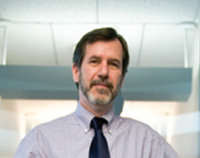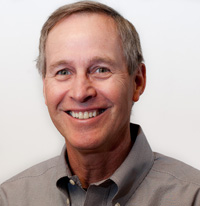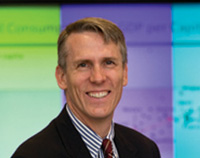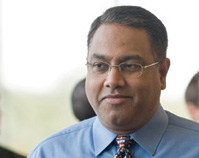 Michael Burke, Lawrence Martin Chair in Business, gave an invited presentation on “Improving Safety and Health for Disaster Cleanup Workers” at the National Institute of Environmental Health (NIEHS) Deepwater Horizon Lessons Learned Workshop, held in Mobile, Ala., on May 4–5. The presentation focused on two of Burke’s studies on worker safety training that serve as guides to improving the preparation of oil spill cleanup workers. These studies, entitled “Relative effectiveness of safety and health training methods” and “How workplace hazards and training influence learning and performance,” appeared in the American Journal of Public Health (2006) and Journal of Applied Psychology (2011), respectively. In addition, a Tulane graduate who conducted her dissertation work with Burke, Sue Ann Sarpy, is leading the national Gulf Oil Spill Response Worker Training Study.
Michael Burke, Lawrence Martin Chair in Business, gave an invited presentation on “Improving Safety and Health for Disaster Cleanup Workers” at the National Institute of Environmental Health (NIEHS) Deepwater Horizon Lessons Learned Workshop, held in Mobile, Ala., on May 4–5. The presentation focused on two of Burke’s studies on worker safety training that serve as guides to improving the preparation of oil spill cleanup workers. These studies, entitled “Relative effectiveness of safety and health training methods” and “How workplace hazards and training influence learning and performance,” appeared in the American Journal of Public Health (2006) and Journal of Applied Psychology (2011), respectively. In addition, a Tulane graduate who conducted her dissertation work with Burke, Sue Ann Sarpy, is leading the national Gulf Oil Spill Response Worker Training Study.
 John Elstrott, clinical professor of entrepreneurship, delivered the presentation “Succession, Purpose and Sustainability” to the Women’s Business Enterprise Council (South) on Jan. 18 in New Orleans. Elstrott was invited by WBEC South board member Michele Vignes, president of Universal Personnel, a local familyowned business and member of the Tulane Family Business Center. Elstrott’s presentation highlighted key issues for family businesses developing succession strategies and included advice for businesses anticipating a succession. On March 29, Elstrott presented “The Higher Purpose of Whole Foods Market” to members of the Orleans Club in New Orleans. The presentation focused on how Whole Foods uses the principle of conscious capitalism to direct its corporate structure. A conscious capitalist company focuses on optimization of stakeholder alignment. Such a company recognizes that no one stakeholder can be compensated in such a way that it damages any other stakeholder and jeopardizes the sustainability of the organization. Elstrott also uses this business model when teaching his entrepreneurship courses at the Freeman School.
John Elstrott, clinical professor of entrepreneurship, delivered the presentation “Succession, Purpose and Sustainability” to the Women’s Business Enterprise Council (South) on Jan. 18 in New Orleans. Elstrott was invited by WBEC South board member Michele Vignes, president of Universal Personnel, a local familyowned business and member of the Tulane Family Business Center. Elstrott’s presentation highlighted key issues for family businesses developing succession strategies and included advice for businesses anticipating a succession. On March 29, Elstrott presented “The Higher Purpose of Whole Foods Market” to members of the Orleans Club in New Orleans. The presentation focused on how Whole Foods uses the principle of conscious capitalism to direct its corporate structure. A conscious capitalist company focuses on optimization of stakeholder alignment. Such a company recognizes that no one stakeholder can be compensated in such a way that it damages any other stakeholder and jeopardizes the sustainability of the organization. Elstrott also uses this business model when teaching his entrepreneurship courses at the Freeman School.
 Geoff Parker, professor of economic sciences, contributed “Putting It Together: How to Succeed in Distributed Product Development,” co-authored with Jason Amaral and Edward G. Anderson Jr., to the winter 2011 issue of MIT Sloan Management Review. The article discusses DPD projects, which involve outsourcing and offshoring parts of the innovation process, and includes suggestions for managing those projects successfully based on research and surveys conducted at more than 20 companies. Parker has also given a number of talks in recent months. In November 2010, Parker delivered three presentations at the Institute for the Management Sciences (INFORMS) meeting in Austin, Texas: “New Business Models to Enable Clean and Renewable Generation in the Electric Power Industry,” “The Influence of Market Structure and Policy on Technology Portfolio Investments” and “Volatility Pricing for Renewable Energy Sources.” In January, Parker delivered the presentation “Platform Growth and Innovation” at the Institut D’Economie Industrielle Workshop on the Economics of Software Industries, which took place in Toulouse, France. In May 2011, Parker delivered two presentations at the Production and Operations Management Society (POMS) meeting in Reno, Nev.: “On the Integration of Emerging Complementary Technologies” and “An Alternative Approach for Evaluating Capacity of Intermittent Electric Power Generation Sources.” Parker was also a panelist at the Louisiana EPSCoR, Louisiana Board of Regents and National Science Foundation workshop Collaborative Scientific Research in Relation to the Gulf Oil Spill. The workshop took place in New Orleans in November 2010.
Geoff Parker, professor of economic sciences, contributed “Putting It Together: How to Succeed in Distributed Product Development,” co-authored with Jason Amaral and Edward G. Anderson Jr., to the winter 2011 issue of MIT Sloan Management Review. The article discusses DPD projects, which involve outsourcing and offshoring parts of the innovation process, and includes suggestions for managing those projects successfully based on research and surveys conducted at more than 20 companies. Parker has also given a number of talks in recent months. In November 2010, Parker delivered three presentations at the Institute for the Management Sciences (INFORMS) meeting in Austin, Texas: “New Business Models to Enable Clean and Renewable Generation in the Electric Power Industry,” “The Influence of Market Structure and Policy on Technology Portfolio Investments” and “Volatility Pricing for Renewable Energy Sources.” In January, Parker delivered the presentation “Platform Growth and Innovation” at the Institut D’Economie Industrielle Workshop on the Economics of Software Industries, which took place in Toulouse, France. In May 2011, Parker delivered two presentations at the Production and Operations Management Society (POMS) meeting in Reno, Nev.: “On the Integration of Emerging Complementary Technologies” and “An Alternative Approach for Evaluating Capacity of Intermittent Electric Power Generation Sources.” Parker was also a panelist at the Louisiana EPSCoR, Louisiana Board of Regents and National Science Foundation workshop Collaborative Scientific Research in Relation to the Gulf Oil Spill. The workshop took place in New Orleans in November 2010.
 Venkat Subramaniam, associate professor of finance, contributed “Firm Structure & Corporate Cash Holdings,” co-authored with Tony Tang, Henry Yue and Cindy Zhou, to Journal of Corporate Finance, Volume 17, Issue 3, pp. 759–773. In the paper, Subramaniam and colleagues analyze the cash holdings of diversified firms (i.e., firms with multiple divisions) and show that they hold less cash than singlesegment firms. The finding continues to hold even after the authors control for size, industry and other factors shown to be important determinants of cash holdings in the extant literature. They offer and empirically test various explanations for the reduced cash holdings among diversified firms.
Venkat Subramaniam, associate professor of finance, contributed “Firm Structure & Corporate Cash Holdings,” co-authored with Tony Tang, Henry Yue and Cindy Zhou, to Journal of Corporate Finance, Volume 17, Issue 3, pp. 759–773. In the paper, Subramaniam and colleagues analyze the cash holdings of diversified firms (i.e., firms with multiple divisions) and show that they hold less cash than singlesegment firms. The finding continues to hold even after the authors control for size, industry and other factors shown to be important determinants of cash holdings in the extant literature. They offer and empirically test various explanations for the reduced cash holdings among diversified firms.
